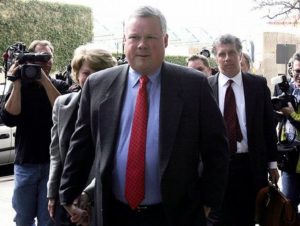 The Chronicle’s Mary Flood reports that former Enron chief accountant Richard Causey, who pled guilty to a single count of securities fraud last week under an plea deal in which he agreed to serve seven years in prison, is still not listed on the most recent witness list that the Enron Task Force was required to provide yesterday to the defense teams of Causey’s co-defendants, former key Enron executives Ken Lay and Jeff Skilling.
The Chronicle’s Mary Flood reports that former Enron chief accountant Richard Causey, who pled guilty to a single count of securities fraud last week under an plea deal in which he agreed to serve seven years in prison, is still not listed on the most recent witness list that the Enron Task Force was required to provide yesterday to the defense teams of Causey’s co-defendants, former key Enron executives Ken Lay and Jeff Skilling.
Ms. Flood reports that the Task Force also dropped several witnesses on three topics — Enron Broadband, the Coyote Springs deal and the valuation of an Enron asset dubbed “Mariner.”
The Task Force’s indecision on whether to use Causey as a witness is really not surprising despite much of the mainstream media’s expectation that he would transform into a key witness against his former co-defendants simply because he agreed to a plea deal.
Unlike discredited former Enron Broadband CEO Ken Rice, Mr. Causey’s plea deal with the Task Force is not a cooperation agreement, so he is under no obligation to assist the Task Force in its prosecution of Messrs. Lay and Skilling.
Moreover, as Ms. Flood notes, the Task Force may still elect to revise its witness list closer to trial to add Causey as a witness and may gain a small tactical advantage in doing so by delaying the delivery of his witness statements to the Lay-Skilling defense team.
However, the Task Force better not wait too long if they want to use Causey because U.S. District Judge Sim Lake probably would not look kindly upon such gamesmanship.
The lastest revelation is just more confirmation that the Task Force is dispensing with a substantial number of its allegations in its indictment against Lay and Skilling regarding alleged accounting fraud and focusing on developing a case that is based on alleged false or non-disclosure of material information to the investing public.
Given the Task Force’s experience in the Enron Broadband case, simplification of its case against Lay and Skilling is probably a prudent move, although it sure opens up legitimate questions that the defense can raise with the jury on why the Task Force alleged in the indictment dozens of other inflammatory allegations — particularly against Skilling — and then didn’t pursue them.
Finally, the Chronicle’s business columnist Loren Steffy wrote this interesting column in which he speculates that Causey’s plea deal was the result of a good man coming to terms with his wrongdoing.
Maybe so, but the circumstantial evidence indicates that my explanation is closer to the truth.
